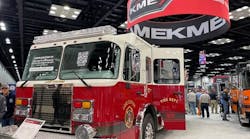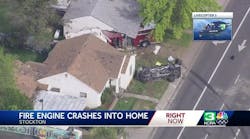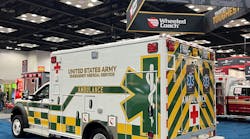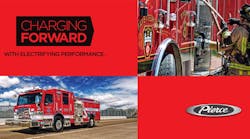Most states' vehicle and traffic laws define emergency operation this way: "The operating or parking of an authorized emergency vehicle when such vehicle is engaged in transporting a sick or injured person; transporting prisoners; pursuing an actual or suspected violator of the law; or responding, working or assisting at the scene of an accident, disaster, police call, alarm of fire, actual or potential release of hazardous materials or other emergency. Emergency operation shall not include returning from such service."
If an accident occurs, an emergency vehicle operator is likely to be judged in this way: "Did you have reasonable grounds, based on dispatch information and personnel experience to believe that you were responding to a TRUE EMERGENCY?"
What Is A TRUE Emergency?
According to the U.S. Department of Transportation (DOT) Emergency Vehicle Operators Course Instructor's Manual, "a TRUE EMERGENCY is a situation in which there is a high probability of death or serious injury to an individual or significant property loss, and action by (you) an emergency vehicle operator may reduce the seriousness of the situation."
If you are involved in an accident where property damage, injury or loss of life occurs, your actions will be evaluated and judged by your department and the citizenry you serve. In most cases, your actions will be judged in a court of law, whether it is a civil court or criminal court, or both. A court will judge your actions from at least two aspects: Was the situation a TRUE EMERGENCY? And did you exercise DUE REGARD for the safety of others?
According to the DOT manual, "Due Regard is based on circumstances." In judging "DUE REGARD," the principal criteria used are: Was there "enough" notice of approach to allow other motorists and pedestrians to clear a path and protect themselves? If you do not give notice of your approach until a collision is inevitable, you have probably not satisfied the principle of due regard for the safety of others.
In determining whether an emergency vehicle operator was exercising due regard in the use of signaling equipment, for example, the courts will consider, the following points:
- A. Was it reasonably necessary to use the signaling equipment, given the circumstances?
- B. Was the signaling equipment actually used?
- C. Was the signal audible and/or visible to motorists and pedestrians?
A widely accepted way of determining "due regard" is, "A reasonably careful man performing similar duties and under the same circumstances, would act in the same manner."
How many of your calls are true emergencies? The answer very few, ironically whether you are a career firefighter in New York City, Bowling Green, KY, or Phoenix, AZ, or a volunteer firefighter in Fuller Road, Lansing, Bethpage, Middle Hope, Howells or Otisville, the percentage of true emergency calls is the same, on average about 2% to 5%. Generally, career departments do far more runs than their volunteer counterparts; however, the percentage of true emergency calls is the same regardless of where you are performing those firefighting duties.
So, one would ask the question why are fire trucks, police cars and ambulances using their lights and sirens almost 100% of the time, when true emergencies make up only 2% to 5% of the total call volume? Why are emergency vehicle operators consistently abusing the privilege (yes it is a privilege) of using emergency lights, sirens and air horns on non-emergency runs?
When I ask these questions as I teach around the country, the answers are pretty much the same: I am safer using the warning equipment when I drive, the apparatus is not covered by insurance unless we use the warning equipment, it's not really a call if we don't use the warning devices, it's not really a fire truck without the lights and sirens on, we are in a hurry to get back to the station to eat, I have to get back home in a hurry, it not thrilling enough, I can't get my adrenaline fix without the lights and sirens, I'm a volunteer firefighter and nobody can tell me how to drive, I have to beat the other companies in, I'm first due, response time isn't everything it's the only thing, etc.
The excuses are many and as varied as the firefighters who drive fire apparatus, but NONE of the excuses are valid, not one. The reality is that with lights and sirens on you are statistically four times more likely to get into an accident and that there is a 10 times more likelihood of serious injury and/or death within the confines of that accident, perhaps even firefighters. Apparatus operators should embrace and be relieved every time they respond without lights or sirens.
Moreover, it is a fact that drugged, drunken and fatigued drivers aim for and run into red flashing lights (visit the website www.respondersafety.com for more information on struck by incidents), so the idea of you being safer with the red or white flashing lights is simply NOT true. Instead, you and your apparatus become a target. www.respondersafety.com Another excuse that I often hear is, "the apparatus will not be covered(insured) without the lights and sirens on." Again, this is simply not true. All of the major fire apparatus insurance companies have programs that highlight the dangers of over-responding (sending apparatus that is not needed), the abuse of lights and sirens and offer recommendations on proper response procedures.
Next time, we will offer recommendations on proper response policies that are in line with the definition of a true emergency. For more information on emergency vehicle driving, aerial apparatus placement or apparatus consulting visit our website at www.emergencyvehicleresponse.com.
Michael Wilbur, a Firehouse® contributing editor, is a lieutenant in the New York City Fire Department, assigned to Ladder Company 27 in the Bronx, and has served for the past five years on the FDNY Apparatus Purchasing Committee. He has consulted on a variety of apparatus related issues throughout the country. For further information access his new website at www.emergencyvehicleresponse.com .




